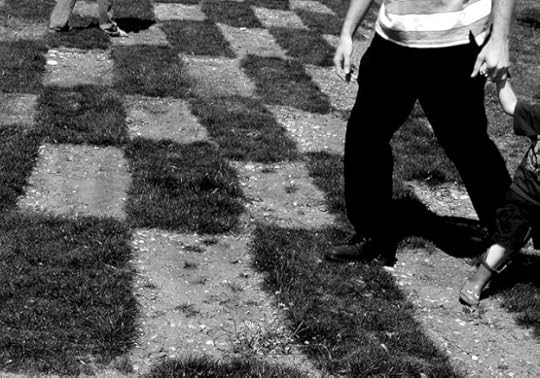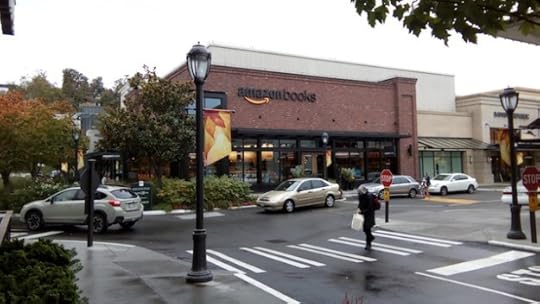Nicholas Carr's Blog, page 13
January 8, 2017
You’ve got mail
From an essay on Radiohead by Mark Greif, in his bookAgainst Everything:
A description of the condition of the late 1990s could go like this: At the turn of the millennium, each individual sat at a meeting point of shouted orders and appeals, the TV, the radio, the phone and cell, the billboard, the airport screen, the inbox, the paper junk mail. Each person discovered that he lived at one knot of a network, existing without his consent, which connected him to any number of recorded voices, w...
January 1, 2017
From Fordism to Googlism
From “The Watchers,” an article by Jonathan Shaw in the new issue of Harvard Magazine:
[Shoshana] Zuboff says that corporate use of personal data has set society on a path to a new form of capitalism that departs from earlier norms of market democracy.She draws an analogy from the perfection of the assembly line: Ford engineers’ discovery a century ago, after years of trial and error, that they had created “a logic of high-volume, low-unit cost, which really had never existed before with all...
December 21, 2016
The Uber advantage
The Guardian reports:
Uber has admitted that there is a “problem” with the way autonomous vehicles cross bike lanes, raising serious questions about the safety of cyclists days after the company announced it wouldopenly defy California regulatorsover self-driving vehicles.
Maybe it’s thebicycle riders who are the “problem” here. You’d thinkthey’d have senseenough to get out of the way of the future, particularly in San Francisco.
Uber will losesome$3 billion this year, after losing $2.2 bill...
December 14, 2016
Thomas Schelling, polarization and the web
Thomas Schelling has died. Schelling’s pathbreaking work in game theory had enormous influence during the Cold War and ultimately earned him aNobel Prize. Italso helps illuminate some ofthe unexpected consequences of the internet as a medium for information-gathering and conversation—in particular the technology’stendency to breed ideological polarization (a tendency that shaped political discourseduring the recentpresidential campaign). In my 2008 book The Big Switch , I discussed how one of...
December 12, 2016
I WANT WINGS!!!!!!!!!!!!!!
What is divinity if it can come
Only in silent shadows and in dreams?
— Wallace Stevens, “Sunday Morning”
I.Angels and Superheroes
In 2008, Samuel O. Poore, a plastic surgeon who teaches at the University of Wisconsin’s medical school, published an article in the Journal of Hand Surgery titled “The Morphological Basis of the Arm-to-Wing Transition.” Drawing on evolutionary and anatomical evidence, he laid out a workable method for using the techniques of modern reconstructive surgery, includ...
November 18, 2016
Meet the new gatekeeper, worse than the old gatekeeper
We want to be freed ofconstraints, until our freedom from constraints reminds us of why we created the constraints in the first place.
Once upon a time — not so long ago, really — there was something called the mainstream media, and it employed lots of journalists and editors and fact-checkers to filter the news. We came to resent these “gatekeepers,” as we took to callingthem, because they restricted what we read and saw. They were self-interested elites who, granted their hegemony through...
November 14, 2016
Inside Amazon Books
Is real the new virtual? With that question in mind, I went undercover last month to reviewAmazon’s Seattle bookshop, the first inwhat’sshaping up to be a national chain, forMIT Technology Review.Here’smy report.
It begins:
As I pull my phone from my pocket and start snapping pictures, I feel like a private eye, or even a secret agent. I’ve just walked into Amazon Books, the web giant’s flagship bricks-and-mortar bookstore in Seattle, but my intentions have little to do with shopping. I’m on...
October 7, 2016
Silicon Valley has our backs
The new road to serfdom — actually, it’s more like a hyperloop — runs right through Silicon Valley. From Tad Friend’s funny-scary profile of Y Combinator president Sam Altman:
The immediate challenge is that computers could put most of us out of work. Altman’s fix is YC Research’s Basic Income project, a five-year study, scheduled to begin in 2017, of an old idea that’s suddenly in vogue: giving everyone enough money to live on. …
The problems with the idea seem as basic as the promise: Why s...
October 5, 2016
Terms of endearment, computer-generated
“As for living,” wrote the French symbolist Auguste Villiers de l’Isle-Adam in his 1890 play Axël, “our servants will do that for us.” Silicon Valley seems intent on giving the infamous remark a new, digital spin: “As for living, our computers will do that for us.”
The latest evidence is Allo, the new Google messaging app that uses artificial intelligence algorithms to generate replies on a user’s behalf. “If your friend sends you a photo of their pet,” Google explained when it launched the s...
September 30, 2016
Those without substance suffer no wounds
An excerpt from “The Snapchat Candidate,” in Utopia Is Creepy :
Twice before in the last hundred years a new medium has transformed elections. In the 1920s, radio disembodied candidates, reducing them to voices. It also made national campaigns much more intimate. Politicians, used to bellowing at fairgrounds and train depots, found themselves talking to families in their homes. The blustery rhetoric that stirred big, partisan crowds came off as shrill and off-putting when piped into a living r...








